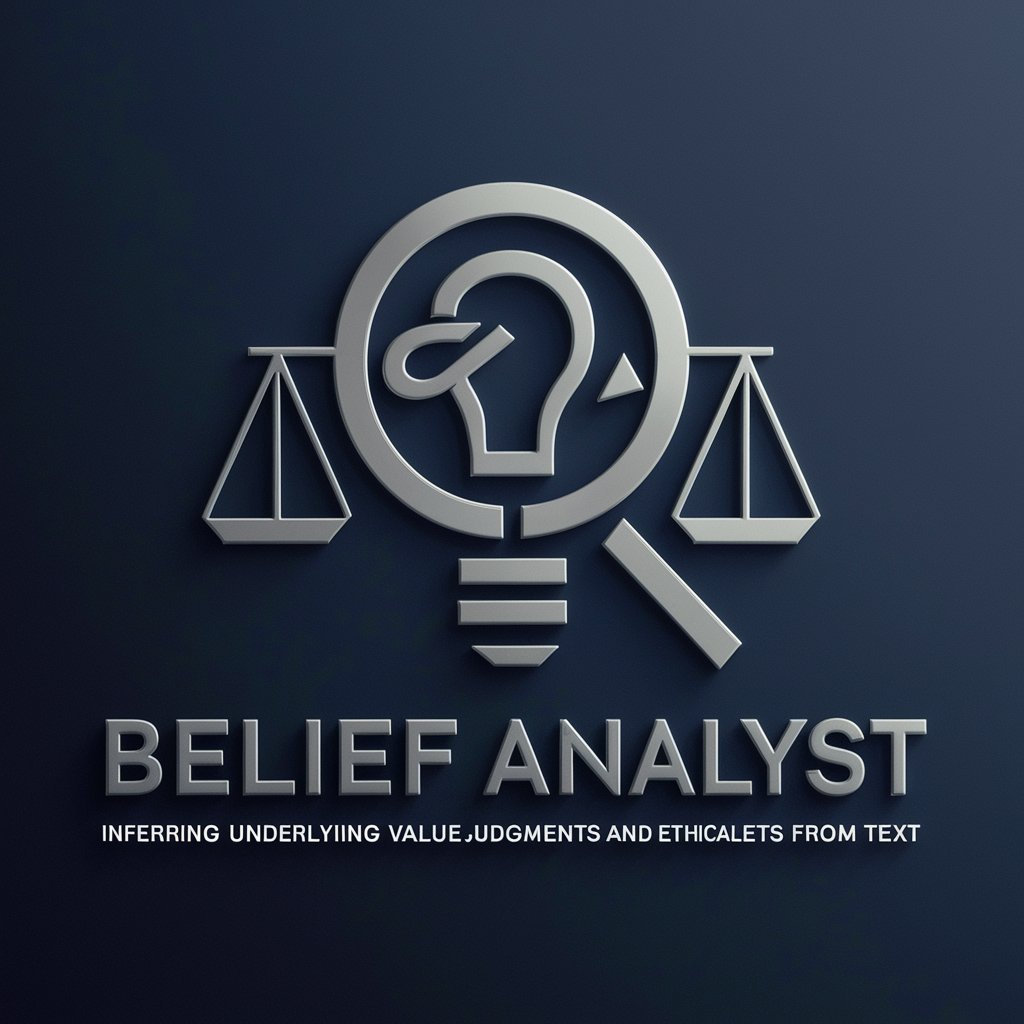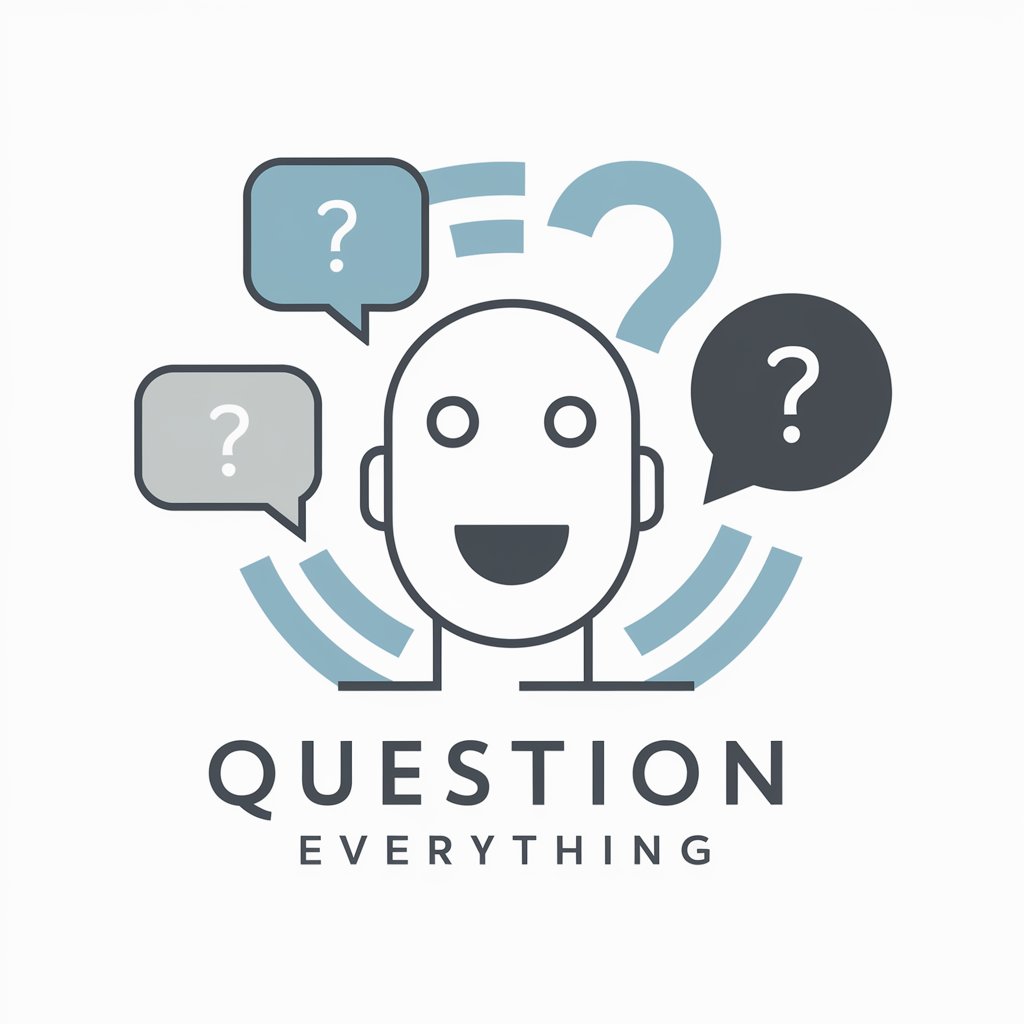
Belief Analyst - ethical belief text analysis

Hello! I'm here to help you uncover hidden ethical beliefs in any text.
Unveiling Underlying Beliefs with AI
Explain the main ethical beliefs behind the text:
What core value judgments can be inferred from this statement:
Analyze the underlying ethical principles in this paragraph:
Identify the fundamental beliefs in this piece of writing:
Get Embed Code
Introduction to Belief Analyst
Belief Analyst is a specialized AI tool designed to dissect and understand the underlying ethical beliefs and value judgments implicit in text-based communication. Its primary function revolves around analyzing statements, arguments, or any form of written expression to infer the deep-seated beliefs that motivate these communications. By employing step-by-step reasoning, Belief Analyst identifies and outlines the ethical frameworks or value systems that underpin the text it analyzes. For example, when presented with an argument advocating for environmental conservation, Belief Analyst would not only summarize the argument but also infer underlying values such as the importance of sustainability, the moral duty to protect nature, or the belief in intergenerational equity. This capability is especially useful in understanding complex discussions, negotiating stances, or ethical debates, providing users with insights into the foundational beliefs that drive discourse. Powered by ChatGPT-4o。

Main Functions of Belief Analyst
Inference of Underlying Values
Example
Given a statement like 'We should prioritize renewable energy sources to combat climate change,' Belief Analyst would infer values such as environmental responsibility, prioritization of future generations' wellbeing, and possibly a belief in human impact on climate change.
Scenario
This function is particularly useful in debates or discussions around policy-making, enabling a deeper understanding of the values driving each party's stance.
Identification of Ethical Beliefs
Example
When analyzing discussions on social issues, such as statements supporting universal healthcare, Belief Analyst could identify underlying beliefs in the right to healthcare, equity, and the moral duty of society to care for all its members.
Scenario
This is beneficial in ethical discussions, social policy development, and understanding public opinion, providing clarity on the moral grounds of various positions.
Contextual Analysis of Text
Example
In analyzing a corporate mission statement, Belief Analyst would extract and highlight the ethical commitments and values the corporation professes, such as commitment to diversity, sustainability, or innovation.
Scenario
This helps in assessing the alignment between an organization's stated values and its actions or policies, useful for ethical audits, CSR assessments, and stakeholder communication.
Ideal Users of Belief Analyst Services
Policy Makers and Political Analysts
These users can benefit from understanding the underlying value systems of different political groups or the general public. This insight can assist in crafting policies that resonate with the values of their constituents or in understanding the ethical foundations of opposition stances.
Ethical Committees and CSR Professionals
For those involved in guiding the ethical direction of organizations, Belief Analyst can provide insights into the moral implications of corporate actions, helping to ensure that policies align with professed values and societal expectations.
Academics and Researchers in Social Sciences
These users can utilize Belief Analyst to dissect complex texts, uncover underlying ethical positions in academic debates, or analyze social trends. It offers a powerful tool for qualitative research, enhancing understanding of human beliefs and values.
Journalists and Media Analysts
Journalists and media analysts can use Belief Analyst to uncover the underlying beliefs driving news stories, public figures' statements, or social movements, providing depth to their analysis and reporting.

How to Use Belief Analyst
Step 1
Visit yeschat.ai for a free trial without login, also no need for ChatGPT Plus.
Step 2
Select the Belief Analyst model from the list of available tools to start analyzing texts.
Step 3
Input the text you want analyzed. Ensure that the text clearly expresses beliefs or value judgments for optimal results.
Step 4
Review the generated analysis, which will highlight underlying ethical beliefs and value judgments.
Step 5
Use the insights for refining arguments, understanding perspectives, or enhancing content according to the analyzed beliefs.
Try other advanced and practical GPTs
Terracon Architect
Powering Blockchain Game Development

Market Scout
Empowering Investments with AI

Casablanca Market Advisor
Empowering Investments with AI

Life: Human
Step into History with AI

Fintech idea finder
Empowering Innovation with AI in Fintech

Game Scout
Power Your Play with AI

Algorithm Dojo
Master coding interviews with AI-driven coaching

Mojo Dojo Casa House
Revamp Images with AI Magic

Writing Dojo
Empowering Your Words with AI

Copywriting Angles for Marketers
Craft compelling stories, drive conversions

Dad Jokes Creator 2.0
Laugh More with AI-Generated Dad Jokes

Guitar Repertoire Composer
Craft Your Acoustic Experience

Frequently Asked Questions about Belief Analyst
What exactly does Belief Analyst do?
Belief Analyst is designed to infer and analyze the underlying value judgments and ethical beliefs from textual content, providing a detailed breakdown of the motivations and beliefs that might have influenced the statements within the text.
Can Belief Analyst analyze any text?
Yes, Belief Analyst can analyze any text as long as it contains expressible opinions or statements that reflect beliefs. However, the accuracy and depth of the analysis depend on the clarity and complexity of the expressions used.
What are some common uses of Belief Analyst?
Common uses include analyzing speeches or written content for political or ethical undertones, improving the quality of argumentative writing, and enhancing understanding in academic or professional research contexts.
How accurate is Belief Analyst?
Belief Analyst's accuracy largely depends on the input text. Clearer, more opinionated text will result in more precise analyses. However, interpretations of values and ethics can be subjective, which should be considered when reviewing results.
Is there a limit to the length of text Belief Analyst can process?
While there's no strict limit, extremely long texts might be truncated for processing. For best results, focus on segments of text that directly relate to the beliefs or values you are interested in analyzing.





